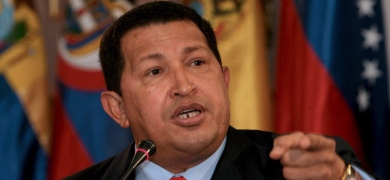The leftist leader slammed Merkel for recent comments saying the Venezuelan leader was not the voice of Latin America and calling on Latin American leaders to distance themselves from Chavez.
“She (Merkel) is from the German right, the same that supported Hitler, that supported fascism, that’s the Chancellor of Germany today,” Chavez said in Caracas.
Merkel is to make her first visit to Latin America next week, travelling to Brazil on Wednesday. She will attend an EU-Latin America summit in Peru. On May 20, the German leader is to visit Colombia and Mexico.
In an interview with the Spanish service of news agency dpa on Saturday, Merkel she had observed a “leftist populism” in some countries in Latin America. “I don’t believe that state-run economies can tackle urgent problems better and in a more sustainable manner. Our experiences in Europe show that,” Merkel said. She also called for more efforts to tackle poverty in Latin America. The EU should support countries to eliminate social inequalities, she added.
Chavez said he could confront Merkel about the statements if he attends the upcoming summit of heads of state from Europe and Latin America in Peru. “Maybe I’ll say something to her and she’ll get mad and say ‘why don’t you shut up?'” he said, in a reference to a row with Spanish King Juan Carlos last November in Santiago de Chile.
At the time, Chavez had tried to interrupt a speech by Spanish Prime Minister José Luis Rodríguez Zapatero at an Iberian-American summit, prompting a strong admonition by King Juan Carlos who said, “Why don’t you shut up?” The spat triggered a week-long crisis between Madrid and Caracas.
On Sunday, Chavez praised Brazilian leader, Luiz Lula da Silva, for making clear to “our blue-blooded friends in Europe” they need not fear Latin America’s Left.
Chavez, who famously called US President George W Bush “the devil” at a UN assembly, is notorious for his inflammatory remarks. On Sunday, he called Colombian President Alvaro Uribe a “liar” who “shouldn’t even run a corner store.” In the past, he has called US Secretary of Defence Donald Rumsfeld “one of the dogs of the devil” and then-President of Mexico Vicente Fox the “lap-dog of the empire.”




 Please whitelist us to continue reading.
Please whitelist us to continue reading.